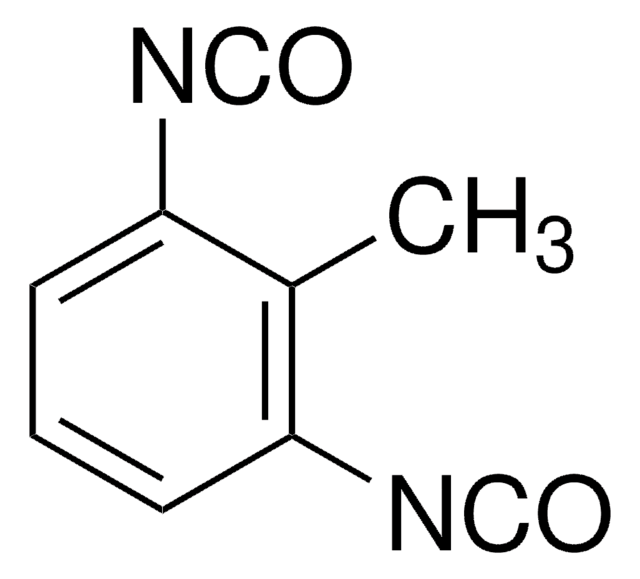216836
Tolylene-2,4-diisocyanate
technical grade, 80%
Synonyme(s) :
2,4-Diisocyanatotoluene, 4-Methyl-1,3-phenylene diisocyanate, 4-Methyl-m-phenylene diisocyanate, BASF LUPRANATE T80, TDI
About This Item
Produits recommandés
Qualité
technical grade
Niveau de qualité
Densité de vapeur
6 (vs air)
Pression de vapeur
0.03 mmHg ( 25 °C)
Pureté
80%
Température d'inflammation spontanée
>1148 °F
Limite d'explosivité
9.5 %
Indice de réfraction
n20/D 1.568 (lit.)
Point d'ébullition
115-120 °C/10 mmHg (lit.)
Pf
20-22 °C (lit.)
Solubilité
acetone and ethanol: soluble(lit.)
alcohol: miscible(lit.)
benzene: soluble(lit.)
carbon tetrachloride: miscible(lit.)
chlorobenzene: miscible(lit.)
diethyl ether: miscible(lit.)
kerosene: miscible(lit.)
olive oil: miscible(lit.)
Densité
1.225 g/mL at 25 °C
Groupe fonctionnel
isocyanate
Température de stockage
2-8°C
Chaîne SMILES
Cc1ccc(cc1N=C=O)N=C=O
InChI
1S/C9H6N2O2/c1-7-2-3-8(10-5-12)4-9(7)11-6-13/h2-4H,1H3
Clé InChI
DVKJHBMWWAPEIU-UHFFFAOYSA-N
Vous recherchez des produits similaires ? Visite Guide de comparaison des produits
Autres remarques
Informations légales
Mention d'avertissement
Danger
Mentions de danger
Conseils de prudence
Classification des risques
Acute Tox. 1 Inhalation - Aquatic Chronic 3 - Carc. 2 - Eye Irrit. 2 - Resp. Sens. 1 - Skin Irrit. 2 - Skin Sens. 1 - STOT SE 3
Organes cibles
Respiratory system
Code de la classe de stockage
6.1A - Combustible acute toxic Cat. 1 and 2 / very toxic hazardous materials
Classe de danger pour l'eau (WGK)
WGK 2
Point d'éclair (°F)
269.6 °F - closed cup
Point d'éclair (°C)
132 °C - closed cup
Équipement de protection individuelle
Eyeshields, Faceshields, Gloves, type ABEK (EN14387) respirator filter
Faites votre choix parmi les versions les plus récentes :
Déjà en possession de ce produit ?
Retrouvez la documentation relative aux produits que vous avez récemment achetés dans la Bibliothèque de documents.
Les clients ont également consulté
Notre équipe de scientifiques dispose d'une expérience dans tous les secteurs de la recherche, notamment en sciences de la vie, science des matériaux, synthèse chimique, chromatographie, analyse et dans de nombreux autres domaines..
Contacter notre Service technique









